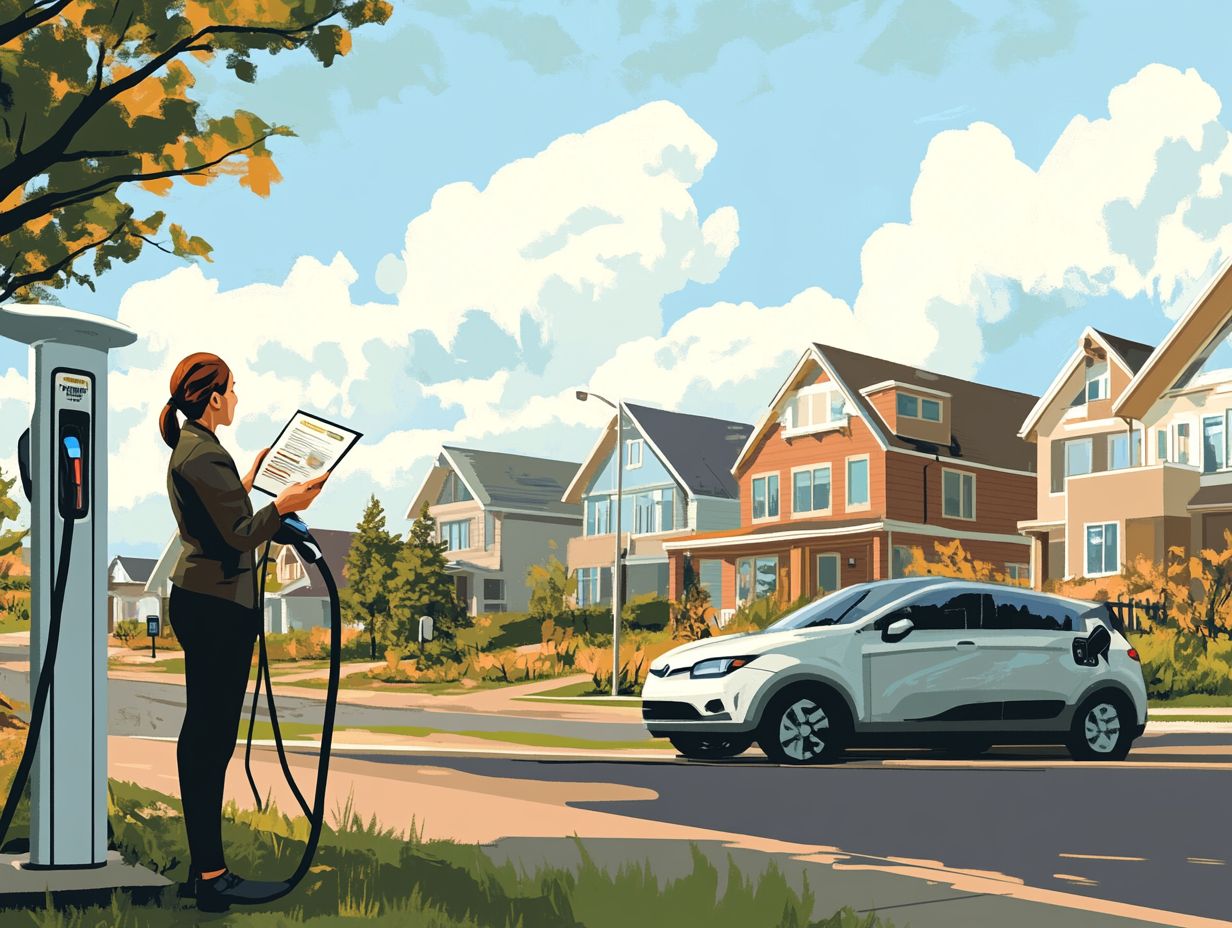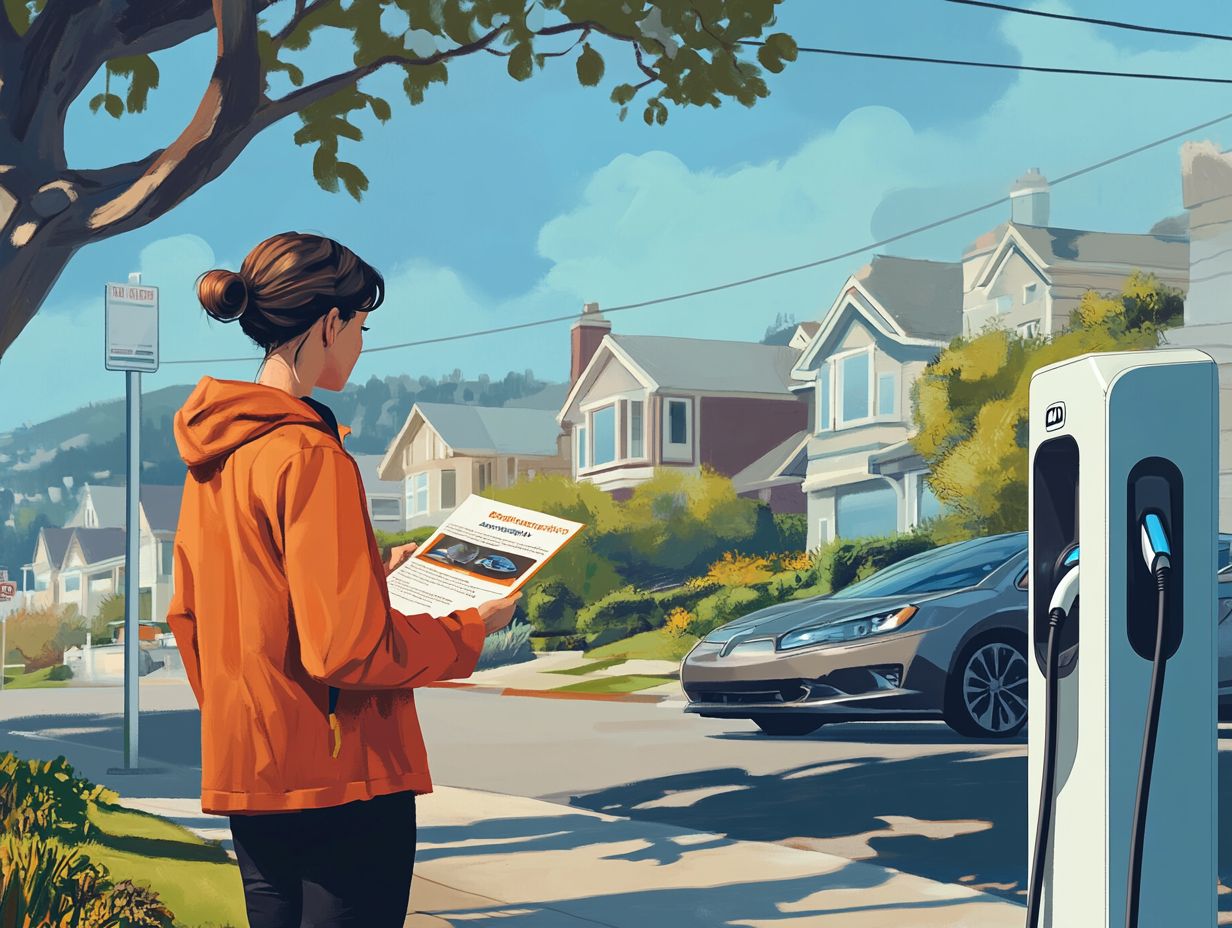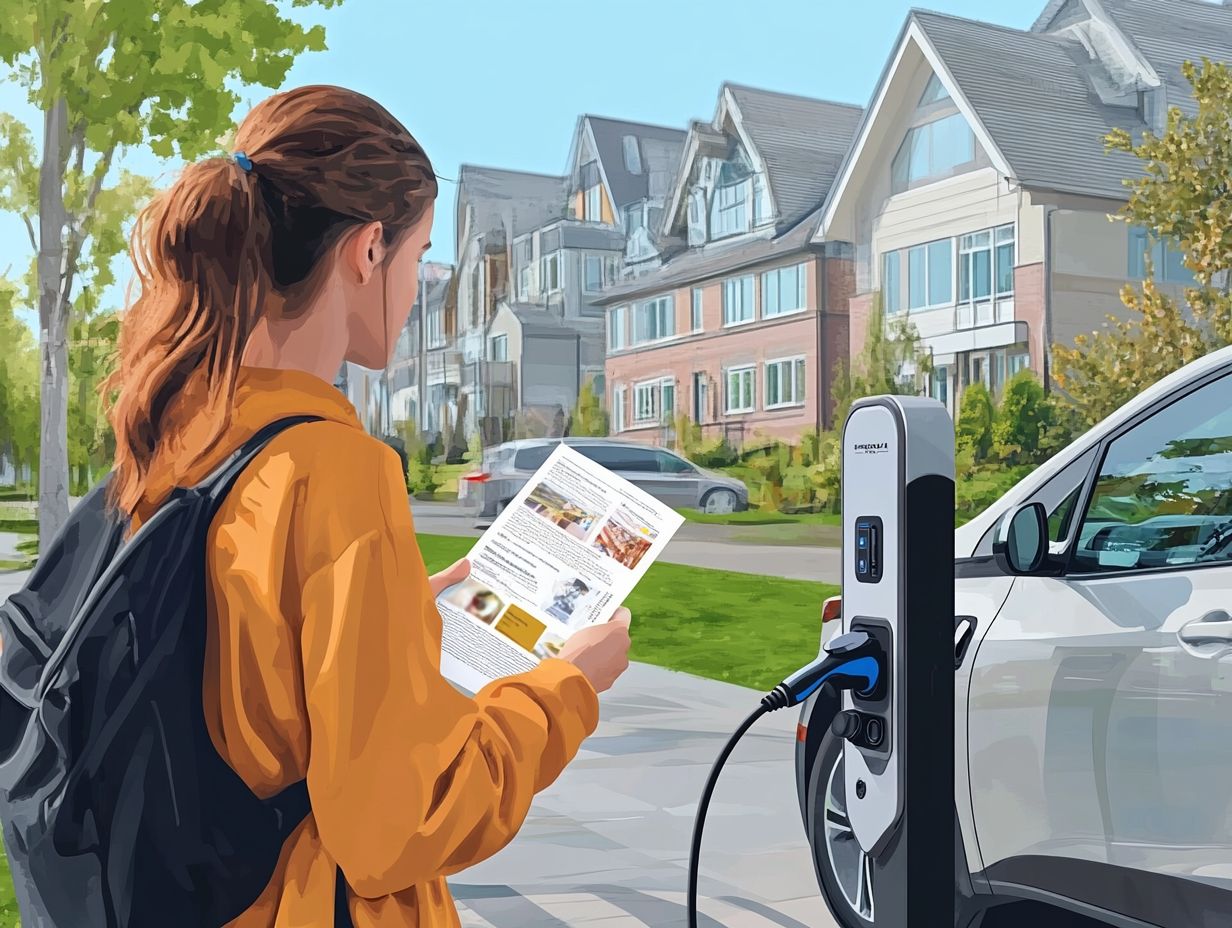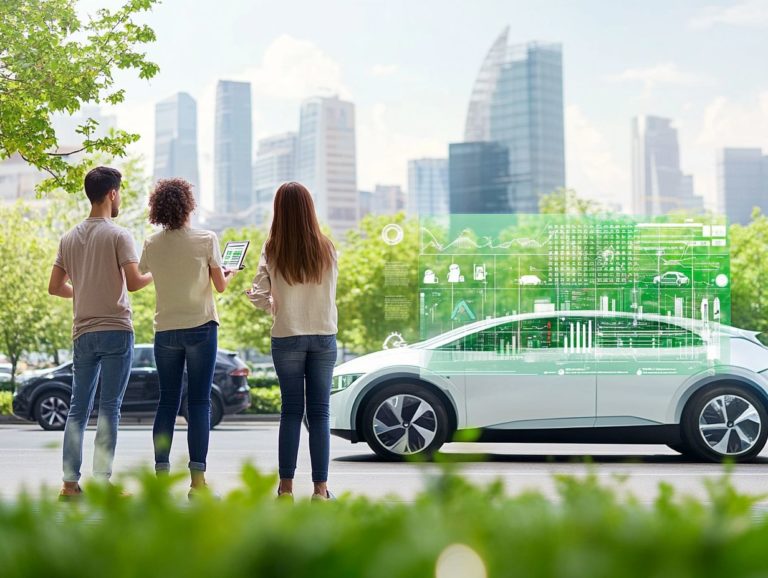are ev incentives right for you?
As electric vehicles (EVs) rise in popularity, you might find yourself curious about the various incentives designed to make your transition more affordable. There are countless opportunities to save money from tax credits and rebates to grants and subsidies, all aimed at easing the financial burden of purchasing an EV.
Get ready! This guide reveals amazing incentives that can save you money on your EV journey. It will walk you through the different types of incentives, the eligibility criteria you’ll need to consider, and how to calculate your potential savings.
By the time you finish, you ll have a clearer understanding of whether an EV incentive aligns with your needs and what factors to weigh when making the switch to electric.
Contents
Key Takeaways:

- EV incentives come in various forms such as tax credits, rebates, grants, and subsidies.
- Eligibility for these incentives depends on factors like income and the type of vehicle.
- To determine if EV incentives are right for you, consider the potential savings along with factors like charging infrastructure and maintenance costs.
- EV incentives can make electric vehicle ownership more affordable, but it’s important to thoroughly research and weigh options before making a decision.
What are EV Incentives?
EV incentives include a variety of programs and financial benefits to help promote the adoption of electric vehicles (EVs) and clean transportation alternatives. Fueled by the Biden administration’s dedication to curbing carbon emissions, these incentives typically encompass tax credits, rebates, and various subsidies designed to make electric cars more affordable and accessible for you. Understanding why EV incentives matter in today’s economy can further highlight their importance.
As you explore the array of EV incentives, it’s essential to examine how they align with vehicle eligibility criteria and the rebate process detailed in the Inflation Reduction Act. Additionally, understanding how to know if an EV is right for me will help you maximize your benefits while making the switch to a cleaner vehicle.
Types of EV Incentives
The landscape of EV incentives includes several distinct types aimed at inspiring both consumers and businesses to invest in electric vehicles and advance sustainable transportation. To maximize your benefits, it’s important to understand how to best utilize EV incentives in 2024. Tax credits and rebates are the most recognized forms of financial assistance, offering direct reductions in tax liability or refunds when you purchase or lease eligible electric cars.
You may also find grants and subsidies available, especially for commercial tax credit initiatives, which encourage the wider adoption of clean vehicles, including used electric vehicles, through various financial support mechanisms.
Tax Credits and Rebates
Tax credits and rebates are compelling incentives for you as a consumer considering an investment in electric vehicles. They significantly lower the effective purchase price through various financial perks. The IRS has laid out clear guidelines for the EV tax credit, enabling eligible buyers to claim a credit based on their vehicle’s battery capacity, enhancing credit eligibility for potential purchases.
The rebate process simplifies access to these incentives, allowing you to enjoy immediate financial relief when you buy or lease an eligible vehicle. The IRS evaluates your eligibility for these credits based on several factors, including the vehicle’s make, model, and battery size, with maximum credit amounts potentially reaching up to $7,500.
To qualify, you must ensure that your vehicle meets specific manufacturing thresholds and appears on the IRS-approved vehicle list. Once you’ve made your purchase, gather the necessary documentation, such as proof of purchase and tax filings, to navigate the rebate process smoothly.
Understanding these nuances not only gives the power to you as a potential buyer but also clarifies the genuine financial benefits of embracing electric vehicles. Be sure to check your eligibility for these incentives or contact local EV dealers for more information!
Grants and Subsidies
Grants and subsidies are vital elements of federal and state initiatives aimed at promoting clean vehicles and bolstering the domestic supply chain for electric cars. These financial aids are often offered by the Department of Energy to support infrastructure development think charging stations and to lower the costs associated with purchasing electric vehicles.
By familiarizing yourself with the available grants and subsidies, you can tap into valuable resources to help offset your investment in clean transportation.
Various programs cater to a diverse array of buyers, from individuals to businesses eager to electrify their fleets. Eligibility criteria may involve income limits, geographical location, or the specific type of vehicle you’re considering.
The benefits can be substantial: you could access significant tax credits, receive rebates on vehicle purchases, or even secure financial support for installing home charging stations.
Collaborating with organizations like the Department of Energy amplifies these initiatives, creating an environment where clean vehicles become increasingly accessible and affordable.
This concerted effort is paving the way toward a greener future, reflecting a strong commitment to sustainability and reducing carbon footprints.
Other Incentives

In addition to tax credits and grants, a range of other incentives can enhance the financial appeal of electric vehicle ownership and leasing, encouraging you to embrace clean transportation. These incentives often include point-of-sale rebates that offer immediate discounts at the time of purchase, as well as commercial tax credits tailored for businesses investing in electric vehicle fleets.
Understanding these additional incentives is essential for both consumers and businesses, helping you make informed decisions when transitioning to electric vehicles.
Another compelling incentive is support for charging infrastructure, which aids in installing electric vehicle charging stations for both residential and commercial properties. These incentives ease the upfront costs of setting up charging facilities and promote broader access to electric vehicles within communities.
If you decide to electrify your fleet, you can save significantly on operating costs over the vehicle’s lifespan, not to mention enhancing your public image to attract environmentally-conscious consumers.
By taking advantage of these incentives, you can lighten your overall financial load while contributing positively to sustainable practices.
Eligibility for EV Incentives
Understanding the eligibility requirements for EV incentives is essential for anyone considering the purchase or lease of an electric vehicle. For a deeper insight, navigating the world of EV financial incentives can help clarify the criteria that often determine the financial benefits you can reap.
Eligibility for credits fluctuates based on factors such as your adjusted income after deductions and the specific vehicles you re looking at, which include popular models like the Chevrolet Bolt, Tesla Model Y, and Volkswagen ID.4.
By ensuring compliance with these guidelines, you can maximize your potential savings and simplify the process of accessing various incentives.
Qualifying Vehicles
To qualify for EV incentives, you’ll need to ensure that the electric vehicles you re considering meet specific requirements, such as particular battery capacities and the price caps set by the IRS.
Popular models like the Chevrolet Bolt, Tesla Model Y, and Chrysler Pacifica often fit the bill, giving you a variety of options in the realm of clean vehicles. It’s crucial to familiarize yourself with the battery requirements and price cap limitations to select an eligible electric vehicle.
Requirements typically focus on a minimum battery size of 7 kWh and a maximum MSRP of around $55,000 for sedans and $80,000 for SUVs and trucks. Notably, models like the Ford Mustang Mach-E and Hyundai Ioniq 5 also qualify.
To ensure your vehicle is eligible, it s a good idea to consult the IRS website for the latest guidelines and utilize tools like VIN lookup services or dealership resources to verify compliance for your selected model.
Understanding these factors not only maximizes your savings but also plays a significant role in the broader adoption of clean energy vehicles.
Ready to explore your options? Check your eligibility for incentives today!
Income and Other Requirements
Income and other requirements significantly influence your credit eligibility for EV incentives, especially regarding the adjusted gross income limits set by the IRS. As a prospective buyer, you ll need to navigate these income thresholds to ensure you qualify for available tax credits and rebates.
By understanding these requirements, you can effectively assess your financial situation and plan your transition to electric vehicles. These benchmarks act as a guideline for determining who qualifies for such incentives, and they often pose a challenge for individuals whose income exceeds the specified limits.
This means that even if you re financially stable, you might find yourself ineligible if your income surpasses the cap. Therefore, it’s essential for you to meticulously evaluate your financial landscape, taking into account deductions, investment gains, and other sources of income to accurately determine your adjusted gross income.
By doing this, you can identify your eligibility and strategize your purchase to maximize your financial benefits.
Calculating Potential Savings
Calculating potential savings when investing in electric vehicles requires a thorough analysis of several factors, such as available EV incentives, purchase or leasing options, and long-term cost savings.
By grasping the various incentives at your disposal, you can accurately estimate your overall savings and evaluate the feasibility of transitioning to electric vehicles.
This calculation not only empowers you to make informed purchasing decisions but also plays a pivotal role in fostering a more sustainable future by reducing the carbon emissions linked to traditional vehicles.
Factors to Consider

- Financing options
- Total cost of ownership
- Expected mileage
- Potential savings on fuel and maintenance
When calculating potential savings from EV incentives, these factors are crucial for fully understanding the financial impact. By grasping these elements, you ll be able to assess the overall benefits of investing in an electric vehicle more effectively.
It s essential to consider both local and federal tax credits, which can significantly lower the initial purchase price. Explore various financing options, like leasing versus buying, as they can be beneficial.
Don t overlook operational costs. These include electricity rates and any incentives for home charging infrastructure, as they can play a pivotal role in your long-term savings.
By understanding your expected usage patterns such as how often you travel long distances or commute daily you ll gain a clearer view of how an electric vehicle can seamlessly integrate into your lifestyle while maximizing your savings.
Making the Decision
Transitioning to electric vehicles is an exciting opportunity that requires careful consideration! You must think about various factors, including available incentives and your personal needs.
As you explore your options, it’s essential to research not only the range of models available but also the government incentives that can significantly ease the financial burden of your purchase. Assessing the availability of charging infrastructure in your area is equally vital, as it directly influences your daily routines.
Evaluating long-term savings on fuel and maintenance will shed light on the financial benefits of owning an electric vehicle. By taking the time to weigh these considerations alongside your unique circumstances such as commuting distances and lifestyle choices you empower yourself to make decisions that resonate with both your environmental values and practical requirements.
Start your journey to a greener future today by exploring your EV options!
Is an EV Incentive Right for You?
Determining whether an EV incentive is right for you requires thoughtful reflection on your unique circumstances, driving preferences, and financial situation. Consider factors such as your daily commute, access to charging infrastructure, and the overall cost benefits of purchasing or leasing an electric vehicle, as well as whether EV incentives are sufficient for mass adoption.
By carefully assessing how these elements align with available EV incentives, you can make a well-informed decision about your investment in clean transportation. You should definitely evaluate your typical driving distances and the frequency of your trips to truly understand the impact of going electric.
If you live in an urban area, you might find more advantages from incentives due to better charging networks. On the other hand, rural dwellers may encounter challenges related to accessibility.
Keeping your budget in mind, along with potential savings over time from reduced fuel and maintenance costs, can significantly shape your decision. Ultimately, a careful look at these factors will guide you through the landscape of how EV incentives affect your insurance costs, ensuring you discover solutions that genuinely align with your lifestyle.
Other Considerations for EV Ownership
Beyond the allure of financial incentives, several key considerations significantly influence your overall experience with electric vehicle (EV) ownership. These factors include the availability of charging infrastructure, the maintenance costs of electric vehicles, and the environmental impact of opting for a cleaner mode of transportation.
By thoughtfully addressing these considerations, you can ensure a smooth transition and fully capitalize on the advantages of owning an EV.
Understanding the landscape of charging options is vital, as easy access to charging stations can greatly enhance the practicality of owning an EV. Maintenance costs tend to be lower for electric vehicles compared to traditional combustion engine cars, which is a compelling selling point for those mindful of their budget.
The environmental benefits of reducing carbon emissions are significant. By evaluating these aspects, you can make informed decisions that resonate with your personal needs and values, ultimately leading to a more fulfilling driving experience.
Frequently Asked Questions
1. What are EV incentives?

EV incentives are financial or non-financial rewards offered by governments, organizations, or car manufacturers to encourage the adoption and use of electric vehicles (EVs).
2. Are EV incentives only for purchasing new EVs?
No, EV incentives can also apply to buying or leasing used EVs. In some cases, incentives may even be available for converting existing gas-powered vehicles into EVs.
3. How can I find out if I am eligible for EV incentives?
The eligibility criteria for EV incentives vary depending on the program and location. It is best to check with your local government or visit the website of the car manufacturer to learn how to find EV incentives in your area to see if you qualify for any incentives.
4. Are EV incentives worth it?
This depends on your individual situation. Incentives can greatly reduce the upfront cost of purchasing an EV, making it more affordable. Additionally, EVs are generally cheaper to maintain and operate compared to traditional gasoline-powered vehicles, adding to the savings.
However, it is important to consider the cost of the EV after the incentives have been applied and weigh it against your specific needs and budget.
5. What kind of EV incentives are available?
There are various types of EV incentives, such as tax credits, rebates, discounts on charging equipment, free parking, and toll exemptions. To learn more about these options, check out what incentives are available for EV buyers? Some incentives may also include perks like carpool lane access and reduced insurance rates for EV owners.
6. Are EV incentives available in all countries?
No, EV incentives are not available in all countries. However, many countries are implementing incentive programs to promote the use of EVs as a more sustainable mode of transportation. It is important to research the incentives available in your specific location.
Don t miss out on potential savings check your local incentives today!






